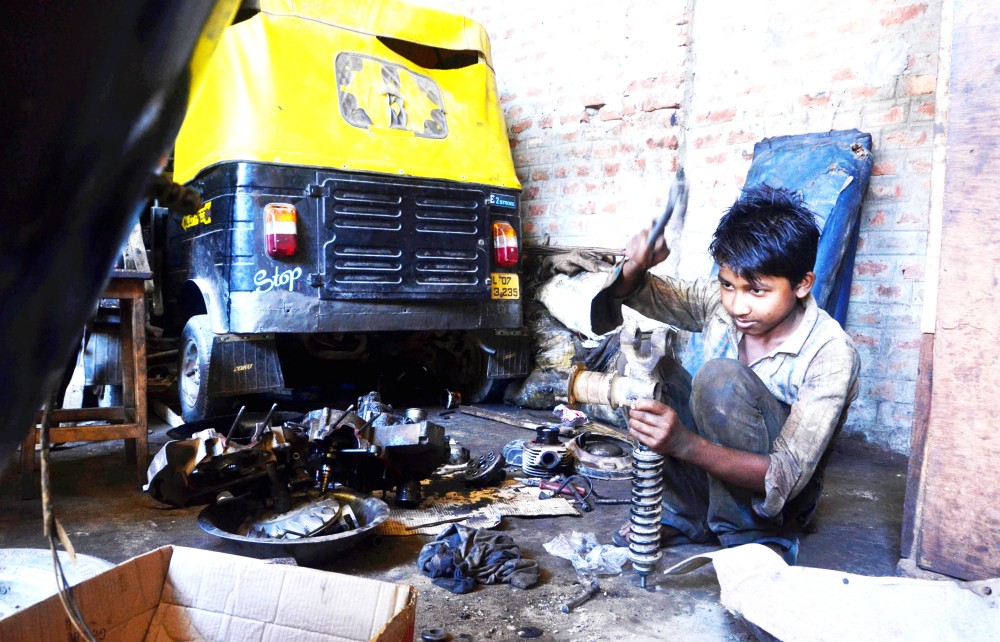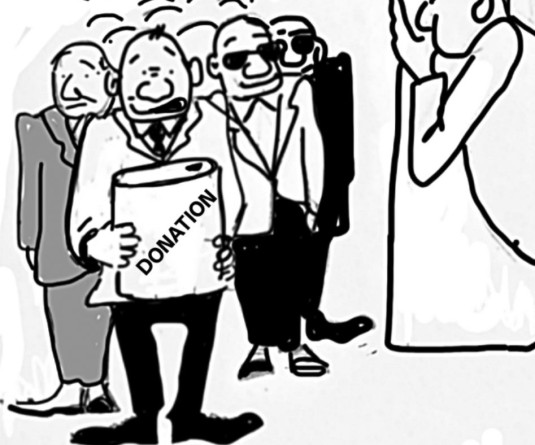Vikram Baruah, 13, works at an auto repair garage in Dimapur, on the "World Day Against Child Labour". (Photo by Caisii Mao)

1827 child labour recorded in Kohima
Our Correspondent
Kohima | June 12
The need to draw up a multi-pronged strategy involving all individuals of the society to eliminate child labour in the state was stressed during the observance of “World Day Against Child Labour” here at the Kohima College under the theme “No to child labour in domestic work.”
Speaking on the occasion, parliamentary secretary for labour & employment, justice & law and revenue department Dr. Nicky Kire declared that the state government is committed to put all efforts in fight against child labour in the state.” He said in Kohima alone the latest department survey have recorded 1827 children working in homes, restaurants workshops and construction sites.
Among them 80% are in the homes working as domestic help, Dr. Kire said adding that the figure will be higher in the domestic sector since the survey could not cover many houses due to restriction of entry to such homes. Dr. Kire said that in Nagaland, “We are still witnesses to the cruel, harsh and inhuman reality of thousands of children who work as domestic child labour in workshops, repairing and cleaning our cars, in construction sites, building our homes, serving us in hotels and restaurants etc, risking their lives infront of us every day.”
Child labour is one of the biggest issues the world has and is still facing, he said adding that its increase has alarmed all governments and has entailed to the creations of laws, programmes and campaigns against it.
Around the world, it is estimated that 215 million children are trapped in child labour, and 115 million of these are in hazardous work including armed conflicts, slavery, drug trafficking and other illegal activities.
17 million children in India work as per official estimates, he said adding that a study found that children were sent to work by compulsion and not by choice, mostly by parents, but with recruiter playing a crucial role in influencing decision. “When working outside the family, children put in an average of 21 hours of labour per week. Poor and bonded families often “sell” their children to contractors who promise lucrative jobs in the cities and the children ended up being employed in brothels, hotels and domestic work,” Dr. Kire said adding that many run away and find a life on the streets.
Dr. Kire stated that every child has right to lead a well protected and secure life away from neglect. However, children working under exploitive and inhuman conditions get neglected badly. Every child has right to development that lets the child explore her/his full potential. An unfavourable living condition of working children prevents them from growing in a free and uninhibited way.
Stating that every child has a right to spend some time on recreational pursuits like sports, entertainment and hobbies to explore and develop, he however regretted that majority of working children do not get time to spend on recreational activities.
He asserted that child labour stunts the growth of future generations and perpetuates poverty by increasing bottlenecks in the developmental process. He said notwithstanding the laudable provisions in the Constitution and other laws of the land, notwithstanding the political will, commitment and determination of the government to eliminate child labour, the problem continues to be a challenging since there is host of social, economic and cultural factors responsible for creation, continuance and perpetuation of child labour.
“To eliminate child labour in its entirety, it is important to identify these factors and draw up a multi-pronged strategy involving all individuals of the society,” Dr. Kire said.
The parliamentary secretary challenged the gathering to be an agent in the fight against “this cruel, harsh, inhuman reality of thousand children who work.” “With your commitment, our government is committed to put all efforts in this fight against child labour in the state,” he declared.
Dr. Kire also released a working paper entitled “Migrant and trafficked children in hazardous employment: The case of Nagaland” by T. Chubayanger, Project Officer Department of Labour, Nagaland. It may be recalled that labour department conducts survey and the recent inspection conducted in hazardous industries and non-hazardous establishments, domestic sector etc. has recorded 6821 and 1904 cases of child labour respectively in the state.
In the panel discussion, Subonenba Longkumer, director, Community Education Centre Society, Dimapur, Sentisashi Aier, associate pastor Kohima Ao Baptist Church and T. Chubayanger, project officer, directorate of labour with Bazo Kire, director Kekhrie Foundation Kohima as moderator, has called for collective effort of each and every individual to address the issue of child labour in the state. Avile Vitso, assistant labour commissioner chaired the function while Kohima College principal Chubatula Longkumer delivered welcome address. Vote of thanks was proposed by joint labour commissioner (HoD) Er. L. Nungshiyanger Aier. The programme was organized by department of labour, Government of Nagaland.





